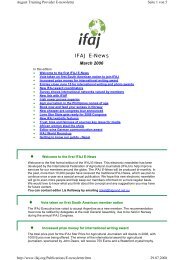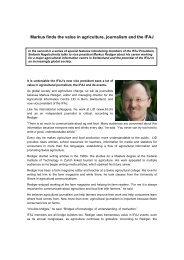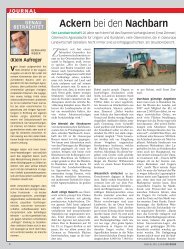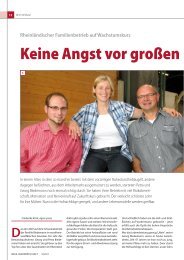Sweden! - International Federation of Agricultural Journalists
Sweden! - International Federation of Agricultural Journalists
Sweden! - International Federation of Agricultural Journalists
Create successful ePaper yourself
Turn your PDF publications into a flip-book with our unique Google optimized e-Paper software.
16 SOLUTIONS FOR A GREEN FUTURE<br />
Milk – animals and dairy farmers<br />
the last 5 years the prices paid to farmers<br />
have varied between 2.75 and 3.50 SEK per<br />
kilo <strong>of</strong> milk.<br />
The majority <strong>of</strong> the Swedish milk<br />
producers deliver their milk to dairy<br />
cooperatives which they co-own with other<br />
farmers and <strong>of</strong> which they are members.<br />
The largest cooperatives are Arla Foods,<br />
Norrmejerier, Milko and Skånemejerier.<br />
Gefleortens and Falköpings are examples<br />
<strong>of</strong> two smaller dairies.<br />
In recent years, a number <strong>of</strong> smaller<br />
dairies have been established which are<br />
owned by a small group <strong>of</strong> farmers who<br />
have merged together.<br />
Export and import<br />
Foreign trade in dairy products constitutes<br />
5–6% <strong>of</strong> the value <strong>of</strong> the total trade<br />
in food supplies. The Swedish import <strong>of</strong><br />
dairy products is more than double as large<br />
as exports. Milk, cream and yoghurt are<br />
the biggest products within both import<br />
and export. <strong>Sweden</strong> clearly imports more<br />
cheese than it exports.<br />
Problems<br />
The problem <strong>of</strong> pr<strong>of</strong>itability within milk<br />
production means that many dairy farms<br />
in <strong>Sweden</strong> have been closed down and as a<br />
result the production <strong>of</strong> milk has decreased<br />
greatly in the last few years. Many dairy<br />
cooperatives suffer from overcapacity and<br />
a number <strong>of</strong> dairies have closed down.<br />
Competition for milk raw materials has<br />
grown.<br />
It is the law in <strong>Sweden</strong> that all cows are<br />
able to graze outdoors in the summer. The<br />
law is much debated and the critics uphold<br />
that the law leads to heightened costs and<br />
worse competition for Swedish dairy farmers<br />
compared to other European farmers. l<br />
Contacts<br />
Svensk Mjölk (www.svenskmjolk.se) – a Swedish dairy farmers association<br />
Husdjursföreningarna (Skånesemin, Svenska Husdjur, Växa Halland, Freja Husdjur, Rådgivarna i Sjuhärad,<br />
Hansa Husdjur, Norrmejerier) – animal husbandry associations<br />
LRF (www.lrf.se) – Swedish Farmers Association<br />
Jordbruksverket (www.jordbruksverket.se) - Swedish Board <strong>of</strong> Agriculture<br />
Sveriges Mjölkbönder (www.sverigesmjolkbonder.se, Chairman Stefan Gård Telephone: +46 (0) 70 62<br />
222 33) – Swedish Dairy Farmers Association<br />
Arla Foods (www.arlafoods.se, press contact: +46 (0) 70 88 44 290) – a dairy farmers cooperative<br />
Norrmejerier (www.norrmejerier.se, press contact Kristina Stiernspetz: +46 (0) 70 2603740) – a dairy<br />
farmers cooperative in northern <strong>Sweden</strong><br />
Milko (www.milko.se, press contact: +46 (0) 70 337 17 17) – a dairy farmers cooperative in central<br />
<strong>Sweden</strong><br />
Skånemejerier (www.skanemejerier.se, +46 (0) 40 31 39 00) – a dairy farmers cooperative in Skåne,<br />
southern <strong>Sweden</strong>










